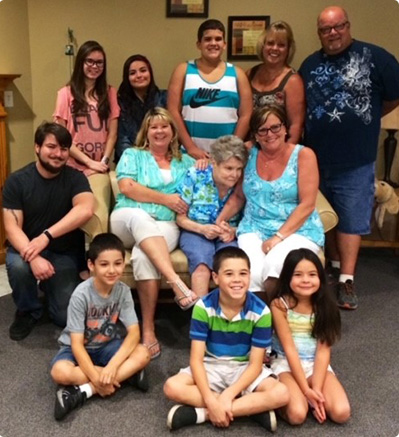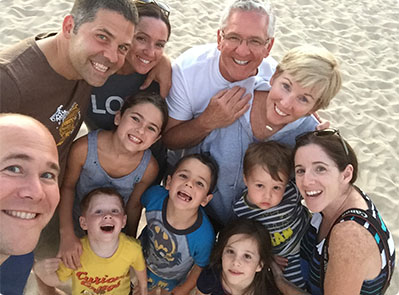
Double Your Love. Double Your Impact.
Double Your Love. Double Your Impact.
Help provide 2x the care and support for millions affected by Alzheimer’s and advance research to bring us closer to a cure. Make a gift during our Double the Love 2x Match now.
Donate NowSandwich generation caregivers fight to find balance
 When Cynthia Valencia’s mother was diagnosed with Alzheimer’s 10 years ago, Cynthia’s plate was already full. She was working 12-hour shifts and raising her own young children as well as her sister’s kids.
When Cynthia Valencia’s mother was diagnosed with Alzheimer’s 10 years ago, Cynthia’s plate was already full. She was working 12-hour shifts and raising her own young children as well as her sister’s kids.But Cynthia knew her mother, Flossie, needed help, and welcomed her into the household. Soon, Cynthia felt the line between mother and daughter bend beneath the pressure of serving as a full-time caregiver.
“I had to stop myself from calling her ‘baby,’ ‘sweetie,’ ‘honey,’” Cynthia says. “When you’re a parent and nurturing your children, it comes so naturally. But this is my mother … even though I was caring for her like a child.”
Like Cynthia, 1 in 4 unpaid dementia caregivers fall into the “sandwich generation,” people who care for their young children as well as a parent living with Alzheimer’s or another dementia.
Because the toll of Alzheimer’s weighs heavy on caregivers who are also raising a family, finding a balance can require major sacrifices.
Alzheimer's caregivers face special challenges
Whether you provide daily caregiving, participate in decision making or simply care about a person living with the disease, we have information and resources.
It takes a village
For two years, Cynthia’s family worked nonstop to care for Flossie at home. It was only when Flossie moved into a senior living community that Cynthia realized the effect those years had on her family.“I turned around and [my kids] were so grown up,” Cynthia says. “They took on a level of responsibility at such a young age. They’re such loving, caring, selfless human beings, and they learned that because they had to be caregivers.”
Even after some of the stress lifted, Cynthia carried a lingering sense of guilt that she wasn’t doing enough — a feeling that lasted until her mother’s death in 2016.
“The only person she really responded to was me,” Cynthia says. “Even when I was [away] and able to go back to a semi-normal life, I couldn’t wait to get back to see her … I felt so guilty to be away.”
Finding balance
 This feeling of guilt is familiar to the Caponi sisters. Michelle and Theresa Caponi are both raising young children and caring for their mother, Jeanne, who was diagnosed with younger-onset Alzheimer’s in 2010.
This feeling of guilt is familiar to the Caponi sisters. Michelle and Theresa Caponi are both raising young children and caring for their mother, Jeanne, who was diagnosed with younger-onset Alzheimer’s in 2010.“The hardest thing is just finding a balance of raising young children and taking care of your parents and wanting to put equal energy and time into both,” Theresa says. “It definitely has its challenges, but in many ways, helping with our mom’s care was a blessing to our young kids. Seeing us as caregivers helped them learn love, compassion and empathy at a young age.”
Theresa and Michelle note that working a full-time or even part-time job outside of the house would have made it nearly impossible to care for their own families while helping their father, who is their mom’s primary caregiver and works full time himself.
“There are times that I don’t feel I am giving enough as a mom and as a daughter,” Michelle says. “But what we have to remind ourselves as caregivers is that we are doing the best we can every day.”
The real cost
For the Valencia and Caponi families, the impact of dementia care is both emotional and financial.When Jeanne moved into a nursing home, Michelle and Theresa’s father postponed his retirement to help cover the cost. Cynthia’s family faced a similar challenge. They reached a point where they could no longer afford Flossie’s living community, but because Cynthia was employed there, the company offered to discount her care.
“I owe them everything,” Cynthia says. “There would’ve been no other choice than for me to quit my job and take care of her out of my house.”
After this experience, Cynthia and her family became advocates for the Alzheimer’s Caregiver Support Act, legislation that, if passed, would provide grants to expand training and support for unpaid dementia caregivers. The bill would help caregivers struggling to find resources by covering services, including caregiver support groups, education and skills-training sessions.
Caregiver health is important
Staying strong emotionally and physically is the best thing you can do when caring for someone living with Alzheimer’s or another dementia.
Caring for caregivers
As much as caregivers devote themselves to people living with Alzheimer’s, they also need to take care of themselves and other caregivers in their family. Cynthia encourages sandwich generation caregivers to ask their children how they’re coping with changes, and offer other family caregivers respite care, if possible.Michelle and Theresa advise caregivers to ask for support from family members, friends and employers, even if it feels uncomfortable.
“We’re just so lucky we have each other,” Theresa says. “Support is the biggest thing, and sometimes you have to ask … the times we did, people jumped at the opportunity. They were just waiting for [a chance to help].”
